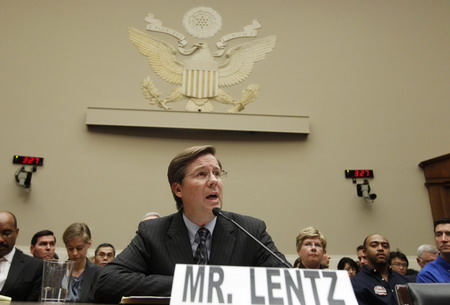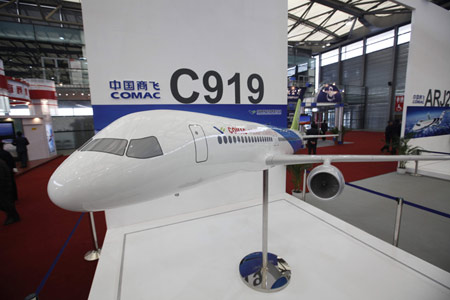Manufacturing
- Details
- By Mengxin
- Hits: 1458

James Lentz, Toyota President and COO of Motor Sales in the US, testifies before a House Energy and Commerce Oversight and Investigations Subcommittee hearing on the "Response By Toyota and NHTSA (National Highway Traffic Safety Administration) to Incidents of Sudden Unintended Acceleration" on Capitol Hill in Washington February 23, 2010.
Massive recalls of popular Toyota cars and trucks still may "not totally" solve frightening problems of sudden, unintended acceleration, the company's American sales chief conceded Tuesday, a day before the Japanese president of the world's largest automaker must confront angry US lawmakers.
House members listened in rapt silence Tuesday to the tearful testimony of a woman whose car unaccountably surged to 100 mph, then they pressed US sales chief James Lentz on the company's efforts to find and fix the acceleration problems - actions many suggested were too late and too limited.
Lentz apologized repeatedly for safety defects that led to recalls of some 8.5 million Toyota cars and trucks, and he acknowledged the changes the company is making probably aren't the end of the story.
Putting remaining doubts to rest is of vital importance to millions more Toyota owners in the United States and elsewhere, who have continued to drive but with serious concerns about their cars. Toyota sales have suffered, too, and a small army of dealers showed up on Capitol Hill Tuesday, arguing that this week's high-profile hearings are unfairly targeting their company.
"We are vigilant and we continue to look for potential causes," Lentz told the House Energy and Commerce Committee.
That search had better continue, a number of lawmakers said, openly questioning Toyota's insistence that the problems are mechanical, not linked to the vehicles' sophisticated electronics.
- Details
- By David Cao
- Hits: 1543

Of 15 top recipients, the Besturn B70 car by First Automotive Works (FAW) Group was the only design patent to win a gold medal at the 11th China Patent Awards in Beijing on Feburary 8.
China's highest government-sponsored patent award, the event aims to boost the nation's intellectual property strategy and accelerate creation of proprietary intellectual property.
The recent awards were the first after a new national intellectual property strategy was announced in 2008. Participating projects were significantly better than those in the previous sessions, according to organizers.
The car design fused traditional Chinese culture with international design trends, creating an image both fashionable and powerful, industry insiders said.
- Details
- By Mengxin
- Hits: 1797

A model of C919 made by Commercial Aircraft Corp of China is displayed. The State-owned company expects to build 2,000 C919s over 20 years. [Bloomberg News]
LONDON/BOSTON: The future of aviation in China, the world's fastest-growing major air-travel market, will be on display in Singapore this week and General Electric Co (GE), Rockwell Collins Inc and GKN Plc all want to be onboard.
Commercial Aircraft Corp of China, also known as Comac, will be at the Singapore Air Show, displaying a model of the 168-seat C919, which is designed to compete with the Boeing Co 737 and Airbus SAS A320. Only one major supplier has been selected for the plane so far, a GE-Safran SA engine venture, which won a $10 billion contract.
State-owned Comac expects to build about 2,000 C919s over 20 years, and hopes to secure 10 percent of the global market, according to Safran. The aircraft is already being touted as a domestic success since the government will place orders and allocate them to State-owned carriers Air China, China Southern and China Eastern Airlines.
Read more: Singapore Air Show offers sneak peek of C919 aircraft
- Details
- By David Cao
- Hits: 1470

China FAW Group Corp has set its sales target for 2010 at more than 2.3 million units, an increase of 18.3 percent from a year earlier, an executive said Sunday.
Jin Yi, FAW Group's deputy general manager, told the 2010 purchase convention that the nation's No 2 carmaker also targets a sales revenue of 290 billion yuan ($42.5 billion), up 11.2 percent from 2009.
The carmaker reported strong sales last year thanks to cuts in purchase tax and subsidies on small car purchases. It sold 1.95 million units last year, with a sales revenue of 260.8 billion yuan. The two figures recorded annual growth of 26.9 percent and 23.4 percent, respectively.
- Details
- By David Cao
- Hits: 1383

China's largest indigenous automaker Chery Auto plans to outsell its home-grown rival BYD Auto this year, the China Business News (CBN) reported today, citing an unnamed source.
Ma Deji, Chery's deputy general manager, said its company has set the 2010 sales target at 700,000 units. But a company insider told the CBN that Chery will not loose ground to the Shenzhen-based BYD Auto, which has planned to sell 800,000 units this year.
The Anhui-based automaker just inaugurated a new plant in Wuhu, Anhui province on Jan 16. With a 10-billion-yuan investment, the plant will finally add up Chery's annual vehicle production capacity to 1 million units after it goes into production in 2012.
Chery had already built a 4.7 billion yuan ($688.3 million) plant in Dalian, Liaoning province last year. The Dalian plant, with an annual production capacity of 200,000 vehicles, is set to go into operation in June 2011.
As of 2009, the automaker was able to produce 600,000 units of vehicles annually. It sold more than 500,000 cars that year, ranking the first among China's home grown automakers.
More Articles …
Page 36 of 55